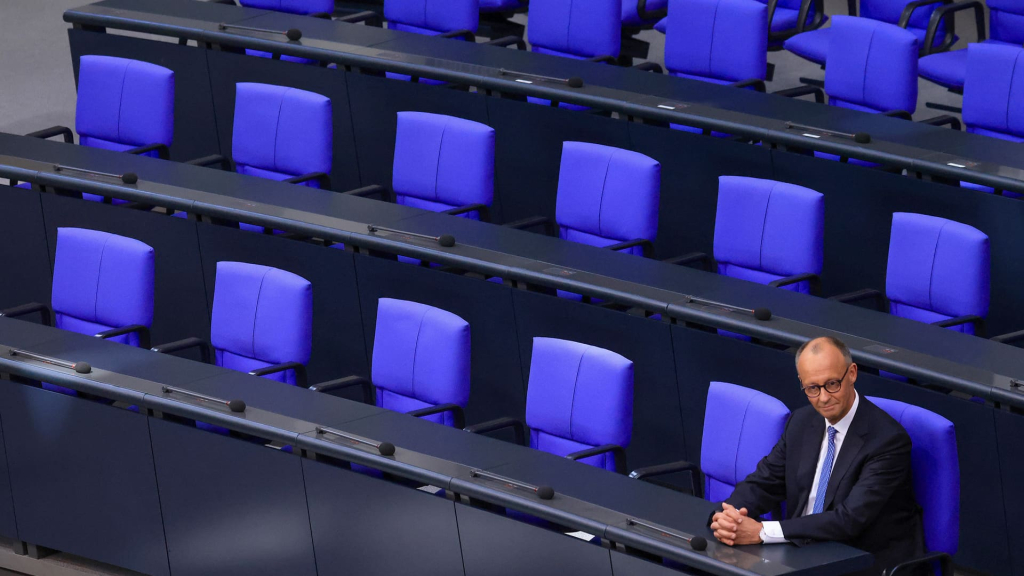In a highly anticipated move for Europe’s largest economy, Friedrich Merz has officially taken office as the new chancellor of Germany, roughly ten weeks following the national election.
However, Merz’s path to leadership was marked by significant drama. In a surprising turn of events, he was not elected in the initial round of voting on Tuesday, a first in contemporary German politics. He did manage to secure the necessary majority in a second attempt later the same day, though his unsteady start has raised concerns among analysts.
“It’s the weakest possible start,” remarked Carsten Brzeski, global head of macro at ING, in an interview with Finance Newso.
Conversely, some experts, like Cyrus de la Rubia, chief economist at Hamburg Commercial Bank, expressed less concern, suggesting that public focus will quickly shift to the government’s actions rather than the initial voting hiccup. “I think that in a week or so from now, nobody will talk much about it anymore,” he noted.
Nonetheless, Merz faces significant challenges ahead as he embarks on his tenure, overseeing a coalition government comprised of the Christian Democratic Union (CDU), its sister party the Christian Social Union (CSU), and the Social Democratic Party (SPD).
Key issues awaiting his attention include national divisions over migration, rising geopolitical tensions surrounding defense spending and trade, a sluggish economy, and the need to maintain unity within the coalition.
Economic Forecasts and Challenges
Germany’s economic landscape will be a priority for Merz, who has made promises focused on reform and increased investment while heavily criticizing the previous government’s economic policies during his campaign.
The country has been grappling with alternating periods of economic growth and contraction for over two years, with the annual gross domestic product (GDP) declining both in 2023 and 2024. Current forecasts do not predict significant recovery on the horizon.
This challenging economic backdrop persists even in light of a substantial fiscal package that emerged from the coalition negotiations, which permits increased defense spending and establishes a 500 billion-euro ($567 billion) fund for infrastructure and climate investment.
While the details of this funding appear secure, uncertainty looms over other fiscal measures and economic policies, according to Brzeski. “I think that the 500 billion euro infrastructure package will not be touched and is a done deal,” he said. However, he cautioned that other initiatives like accelerated investment write-offs and corporate tax reductions in 2028 have become less certain, potentially leading to budgetary conflicts.
Franziska Palmas, a senior Europe economist at Capital Economics, also believes the fiscal initiatives will proceed as intended, which she claims could significantly boost GDP growth and help lift Germany from its long-standing stagnation. However, she identified heightened risks stemming from dissension within the coalition that could undermine the alleged benefits.
Trust among coalition members is essential, according to Otto Fricke, a former Bundestag member from the Free Democratic Party. “The problem really is that it comes down to the most important issue in politics: trust,” he stated. Rapid legislative changes are crucial for Germany’s economic revitalization, he added.
“Therefore, you need trust within the cabinet, within the parliament, to do the legislation fast.”
Seeking Political Harmony Amidst Tensions
Palmas pointed out that Merz has promised a more stable government compared to the past administration, which collapsed over disagreements regarding fiscal policies.
Despite the rocky beginning, the risk of failing to deliver on promises of a more efficient and cohesive government has increased, she warned. However, de La Rubia highlighted that the coalition agreement between the CDU/CSU and SPD suggests that political alignment is still feasible. He noted that the parties share common grounds on critical issues such as infrastructure investment and defense spending, which should facilitate cooperation without intense conflict.
While Merz’s initial setbacks might have served as a lesson for him from parliament members, de la Rubia advocated for not shying away from substantial reforms. “It does not mean and it must not mean that they have to refrain from doing the necessary reforms with respect to modernizing infrastructure, reducing red tape, improving digitalization processes, and addressing labor shortages,” he stressed.
“I have few doubts about that the new government will be able to implement its big policy goals.”


























